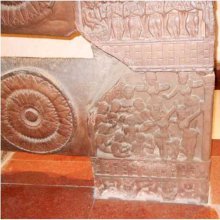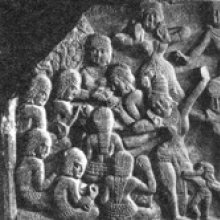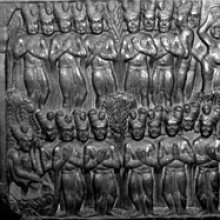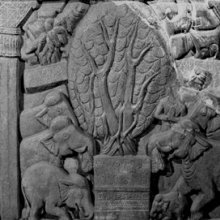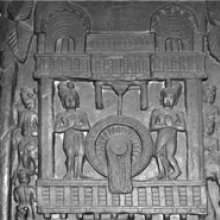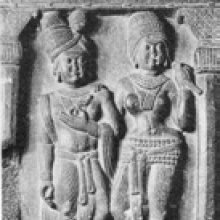Prasenajit: 13 definitions
Introduction:
Prasenajit means something in Buddhism, Pali, Hinduism, Sanskrit, Jainism, Prakrit. If you want to know the exact meaning, history, etymology or English translation of this term then check out the descriptions on this page. Add your comment or reference to a book if you want to contribute to this summary article.
Images (photo gallery)
(+2 more images available)
In Hinduism
Purana and Itihasa (epic history)
Source: Wisdom Library: Bhagavata Purana1) Prasenajit (प्रसेनजित्):—Son of Viśvabāhu (son of Mahasvān). He had a son named Takṣaka. (see Bhāgavata Purāṇa 9.12.8)
2) Prasenajit (प्रसेनजित्):—Son of Lāṅgala (son of Śuddhoda). He will be born in the future and become a king. He will have a son called Kṣudraka. (see Bhāgavata Purāṇa 9.12.14)
Source: archive.org: Puranic Encyclopedia1) Prasenajit (प्रसेनजित्).—Father of Suyajñā, wife of Mahābhāma. As a King he did godāna (gift of cows) for many years and attained Puṇyaloka in the end. (Śloka 20, Chapter 95, Ādi Parva).
2) Prasenajit (प्रसेनजित्).—Father of Reṇukā, wife of the sage Jamadagni. Jamadagni abandoned the beautiful Reṇukā once but fearing a curse Prasenajit gave her again to Jamadagni. (Chapter 58, Brahmāṇḍa Purāṇa).
3) Prasenajit (प्रसेनजित्).—A distant brother of Satrājit called Bhava. (Dākṣiṇātya Pāṭha, Chapter 14, Sabhā Parva).
4) Prasenajit (प्रसेनजित्).—A King who lived in the city of Śrāvastī. Once a very virtuous brahmin came to this city. Finding him to be a man of great virtues a Vaiśya took him to his house and kept him there worshipping him. Many rich men coming to know of the brahmin came and worshipped him with offerings of costly clothes and ornaments. Within a short time the poor brahmin got a huge heap of gold and silver. He collected his lot and at night without letting anybody know went and buried it in a secret place in the forest. After some days he went and looked for it and found his buried wealth missing. When the brahmin returned weeping, the host, the Vaiśya, gathered from him all that had happened. The house-holder consoled him but the miserly and greedy brahmin was not to be pacified thus and he started to commit suicide. He went to a pond nearby and was about to jump into it when Prasenajit who heard about this came to the spot and told him thus:—"Do not grieve over your loss. I shall make enquiries about it and if the stolen wealth is not recovered I shall give you compensation from my treasury."
After consoling the brahmin thus the King went to his palace. He pretended to be ill and called the physicians of the city to his side. He asked them about their patients, their illness and the medicines prescribed for them. One of the physicians during the enquiry said thus: "Oh lord, Mātṛdattavaṇik is my patient. Yesterday I prescribed to him the root of Ūraka plant." The King soon dispersed the physicians and sent for Mātṛdattavaṇik and asked him who had brought for him the root. When Mātṛdattavaṇik replied that it was his servant the King sent for the servant and on questioning the servant the latter confessed having taken the hidden treasure. Thus because of the intelligence and wisdom of the King the brahmin got back his wealth. (Taraṅga 7, Madanamañcukālambaka, Kathāsaritsāgara).
Source: Cologne Digital Sanskrit Dictionaries: The Purana Index1a) Prasenajit (प्रसेनजित्).—A son of Viśvasāhvan, and father of Takṣaka.*
- * Bhāgavata-purāṇa IX. 12. 7-8.
1b) A son of Lāngala and father of Kṣudraka.*
- * Bhāgavata-purāṇa IX. 12. 14.
1c) A son of Siddhārtha.*
- * Matsya-purāṇa 271. 13.
1d) A son of Haimavatī (Kṛśāśva, Viṣṇu-purāṇa) and father of Yuvanāśva.*
- * Vāyu-purāṇa 88. 64; Viṣṇu-purāṇa IV. 2. 47-8; Brahmāṇḍa-purāṇa III. 63. 66.
1e) A son of Rāhula. Father of Kṣudraka.*
- * Vāyu-purāṇa 99. 289; Viṣṇu-purāṇa IV. 22. 8-9.

The Purana (पुराण, purāṇas) refers to Sanskrit literature preserving ancient India’s vast cultural history, including historical legends, religious ceremonies, various arts and sciences. The eighteen mahapuranas total over 400,000 shlokas (metrical couplets) and date to at least several centuries BCE.
Kavya (poetry)
Source: Wisdom Library: Kathāsaritsāgara1) Prasenajit (प्रसेनजित्) is the name of an ancient king from Śrāvastī, according to the Kathāsaritsāgara, chapter 30. Accordingly, as Kaliṅgasenā said to Somaprabhā: “... but now the king of the name of Prasenajit, who lives in Śrāvastī, has sent a messenger, and he alone has been received with honourable distinction by my father [Kaliṅgadatta]... For he is born in that family in which were born Ambā and Ambālikā, the paternal grandmothers of the Kurus and Pāṇḍus”.
2) Prasenajit (प्रसेनजित्) is the name of an ancient king from Viṭaṅkapura, as mentioned in the eighth story of the Vetālapañcaviṃśati in the Kathāsaritsāgara, chapter 82. Accordingly, “... so the three brothers [sons of the Brāhman Viṣṇusvāmin] fell to quarrelling with one another, and being completely under the domination of conceit, they left that turtle and went off immediately to the court of the king of that country, whose name was Prasenajit, and who lived in a city named Viṭaṅkapura, in order to have the dispute decided”.
3) Prasenajit (प्रसेनजित्) is the name of an ancient king from Supratiṣṭhita, according to the Kathāsaritsāgara, chapter 112. Accordingly, as king Pālaka said: “... long ago King Prasenajit, in a city named Supratiṣṭhita, had a very beautiful daughter named Kuraṅgī. One day she went out in the garden, and an elephant, that had broken from its fastenings, charged her, and flung her up on his tusks, litter and all”.
The Kathāsaritsāgara (‘ocean of streams of story’), mentioning Prasenajit, is a famous Sanskrit epic story revolving around prince Naravāhanadatta and his quest to become the emperor of the vidyādharas (celestial beings). The work is said to have been an adaptation of Guṇāḍhya’s Bṛhatkathā consisting of 100,000 verses, which in turn is part of a larger work containing 700,000 verses.

Kavya (काव्य, kavya) refers to Sanskrit poetry, a popular ancient Indian tradition of literature. There have been many Sanskrit poets over the ages, hailing from ancient India and beyond. This topic includes mahakavya, or ‘epic poetry’ and natya, or ‘dramatic poetry’.
General definition (in Hinduism)
Source: eScholarship: Kosalan PhilosophyPrasenajit (प्रसेनजित्) (Pāli: Pasenadi) was the king of Kosala and a contemporary of Gotama Buddha. His sister, Kosaladevī, married King Bimbisāra. Prasenajit’s first queen, Mallikā, became a follower of the Buddha. King Prasenajit is said to have met with the Buddha at his capital of Śrāvastī. Despite Prasenajit’s generous support to Gotama, because the Nikāyas record him giving villages to brāhmaṇas, Pathak suggests that the Kosalan king remained a follower of the Vedic religion
In Buddhism
Mahayana (major branch of Buddhism)
Source: Wisdom Library: Maha Prajnaparamita Sastra1) Prasenajit (प्रसेनजित्) is the name of a king of olden times subdued by the Buddha mentioned in order to demonstrate the fearlessness of the Buddha according to the 2nd century Mahāprajñāpāramitāśāstra chapter XL.1.4. Accordingly, “a hundred thousand Che-tseu (Śākya) who all were great kings in Jambudvīpa, king Po-sseu-ni-che (Prasenajit), etc., all became his disciples”. Note: Prasenajit, king of Kosala, became upāsaka after the preaching of the Daharasutta (Saṃnyutta, I, p. 70; Mūlasarv. Vin, T 1450, k. 9, p. 142b–143a). The Traité has already mentioned this king and will return to him later, k. 27, p. 261a18; k. 33, p. 305a8; k. 58, p. 470b15.
2) Prasenajit (प्रसेनजित्) is the name of a king who invited Udraka Rāmaputra according to the Vibhāṣā mentioned in a footnote at the 2nd century Mahāprajñāpāramitāśāstra (chapter XXVIII). Accordingly, “Once there was a ṛṣi named Mong Hi tseu (Udraka Rāmaputra); he was invited at meal-time by king Cheng kiun (Prasenajit) and, mounted on his power of abhijñā, he flew like a royal swan (rājahaṃsa) to the palace. The king himself received him, placed him on a golden bed, burned incense, threw flowers, served him with delicious foods with many courtesies. The meal finished, the ṛṣi put away his bowl, made his ablutions and, having blessed the king, returned flying through space”.

Mahayana (महायान, mahāyāna) is a major branch of Buddhism focusing on the path of a Bodhisattva (spiritual aspirants/ enlightened beings). Extant literature is vast and primarely composed in the Sanskrit language. There are many sūtras of which some of the earliest are the various Prajñāpāramitā sūtras.
In Jainism
General definition (in Jainism)
Source: Wisdom Library: JainismPrasenajit (प्रसेनजित्) is the name of a kulakara (law-giver) according to both Śvetāmbara and Digambara sources. His wife is named Cakṣuḥkāntā according to Śvetāmbara, but Amitamati according to Digambara. The kulakaras (similair to the manus of the Brahmanical tradition) figure as important characters protecting and guiding humanity towards prosperity during ancient times of distress, whenever the kalpavṛkṣa (wishing tree) failed to provide the proper service.
These law-givers (e.g., Prasenajit) are listed in various Jain sources, such as the Bhagavatīsūtra and Jambūdvīpaprajñapti in Śvetāmbara, or the Tiloyapaṇṇatti and Ādipurāṇa in the Digambara tradition.
Source: archive.org: TrisastisalakapurusacaritraPrasenajit (प्रसेनजित्) is the son of Abhicandra and Pratirūpā, according to chapter 1.2 [ādīśvara-caritra] of Hemacandra’s 11th century Triṣaṣṭiśalākāpuruṣacaritra: an ancient Sanskrit epic poem narrating the history and legends of sixty-three illustrious persons in Jainism.
Accordingly,
Source: HereNow4u: Lord Śrī Mahāvīra“[...] finally twins were borne by [Abhicandra and] Pratirūpā, just as the moon, desired by many creatures, is borne by the night. The parents gave the name Prasenajit to the son, and to the daughter the name Cakṣuḥkāntā, because she was pleasing to the eye.Having shorter lives than their parents, with the dark luster of the betel-vine, together they gradually grew up like intellect and vigor. Both six hundred bows tall, having equal beauty, they were like day and, night of the equinox.
[...] Then in the same place Prasenajit became lord of the twins. For generally the sons of the eminent are also eminent. Then the twins gradually transgressed the Hākāra-law and the Mākāra-law, as those afflicted by love transgress modesty and the bounds of good behavior. Prasenajit made another law of Dhikkā, resembling a charm for terrifying the great bhūt of transgression. Clever in their administration, by these three laws he ruled all the people like an elephant by the three yatas. Then toward the end of the time (i.e. her life) Cakṣuḥkāntā bore twins, a boy and girl [i.e., Marudeva and Śrīkāntā], whose lives were somewhat shorter. [...] Then after death Prasenajit was born among the Dvīpakumāras, and Cakṣuḥkāntā at the same time among the Nāgakumāras”.
Prasenajit (प्रसेनजित्) is the name of the father of Śreṇika.—King Śreṇika Bimbasāra or Bhambhāsāra of the Śiśunāga clan was a famous and brave king. He belonged to Vāhīka clan as he hailed from Vāhīka country. Śreṇika was the king of Magadha and one of the prominent king-followers of Mahāvīra. His father Prasenajita was a devotee of Pārśvanātha and a votary with right perception. Some texts in Jain literary tradition say that he dissociated himself from the Jain religion for some time even though he was a born Jain.

Jainism is an Indian religion of Dharma whose doctrine revolves around harmlessness (ahimsa) towards every living being. The two major branches (Digambara and Svetambara) of Jainism stimulate self-control (or, shramana, ‘self-reliance’) and spiritual development through a path of peace for the soul to progess to the ultimate goal.
Languages of India and abroad
Sanskrit dictionary
Source: Cologne Digital Sanskrit Dictionaries: Cappeller Sanskrit-English DictionaryPrasenajit (प्रसेनजित्).—[masculine] names of [several] princes.
Source: Cologne Digital Sanskrit Dictionaries: Monier-Williams Sanskrit-English DictionaryPrasenajit (प्रसेनजित्):—[=prasena-jit] [from pra-sena] m. Name of sub voce princes ([especially] of a sovereign of Śrāvastī contemporary with Gautama Buddha, [Monier-Williams’ Buddhism 407]), [Mahābhārata; Rāmāyaṇa; Harivaṃśa; Purāṇa etc.]
Source: DDSA: Paia-sadda-mahannavo; a comprehensive Prakrit Hindi dictionary (S)Prasenajit (प्रसेनजित्) in the Sanskrit language is related to the Prakrit word: Paseṇai.
[Sanskrit to German]
Sanskrit, also spelled संस्कृतम् (saṃskṛtam), is an ancient language of India commonly seen as the grandmother of the Indo-European language family (even English!). Closely allied with Prakrit and Pali, Sanskrit is more exhaustive in both grammar and terms and has the most extensive collection of literature in the world, greatly surpassing its sister-languages Greek and Latin.
See also (Relevant definitions)
Partial matches: Jit, Prasena, Jeet.
Starts with: Prasenajita, Prasenajiti.
Full-text (+64): Bhagirathayashas, Prasenajiti, Mrigara, Kshudraka, Takshaka, Kurangi, Bahuda, Mrigadhara, Gandaka, Virudhaka, Langala, Suyajna, Shrikarana, Pasenai, Malika, Ekapundarika, Cakshuhkanta, Rahula, Vishvabahu, Vishvasahvan.
Relevant text
Search found 34 books and stories containing Prasenajit, Prasena-jit; (plurals include: Prasenajits, jits). You can also click to the full overview containing English textual excerpts. Below are direct links for the most relevant articles:
The Skanda Purana (by G. V. Tagare)
Chapter 89 - The Greatness of Pūtikeśvara (pūtika-īśvara-tīrtha) < [Section 3 - Revā-khaṇḍa]
Chapter 5 - Dialogue between Nārada and Sutanu < [Section 2 - Kaumārikā-khaṇḍa]
Trishashti Shalaka Purusha Caritra (by Helen M. Johnson)
Part 7: Defense of Prasenajit < [Chapter III - Birth, youth, initiation, and omniscience of Śrī Pārśva]
Part 5: Founding of Rājagṛha < [Chapter VI - Adoption of right-belief by Śreṇika]
Part 1: Prasenajit in Kuśāgrapura < [Chapter VI - Adoption of right-belief by Śreṇika]
The Bhagavata Purana (by G. V. Tagare)
Chapter 12 - The Description of Ikṣvāku’s Race (concluded) < [Book 9 - Ninth Skandha]
Kathasaritsagara (the Ocean of Story) (by Somadeva)
Note on the story of King Prasenajit < [Notes]
Chapter XXXI < [Book VI - Madanamañcukā]
Maha Prajnaparamita Sastra (by Gelongma Karma Migme Chödrön)
Appendix 11 - Origin of the story of Gaṇḍaka < [Chapter XIV - Emission of rays]
The Mallikā-Jātaka [notes] < [I. Puṇyakriyāvastu consisting of generosity]
IV. How do we know that the Buddha is fearless? < [Part 1 - The four fearlessnesses of the Buddha according to the Abhidharma]
The Vishnu Purana (by Horace Hayman Wilson)
Chapter XXII - Future princes of the family of Ikshvaku < [Book IV]
Chapter II - Birth of Ikshvaku and narration of Kakutstha < [Book IV]
Legend of Paraśurāma < [Book IV]
